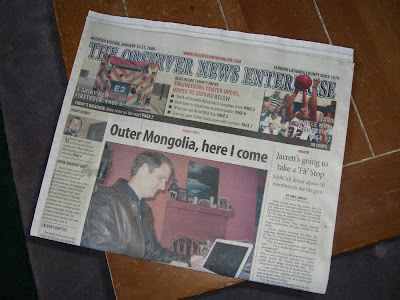The professional attributes that you plan to use, and what aspirations you hope to fulfill, during your Peace Corps service.
I plan to use my knowledge and personal experience within the American and Costa Rican medical systems while in Mongolia, including my knowledge as a Biology major, my extensive shadowing of doctors in a variety of disciplines and environments and my personal experience as a nursing assistant and health volunteer. I also expect to utilize my public speaking and teaching experience: I have given speeches to crowds of as small as 25 people and as large as 5,000 people as well as taught in a variety of classes as a substitute teacher in elementary school, middle school, and high school and as a seminar teacher in college.
I aspire to learn more about international development as a whole and understand how the Peace Corps, United States governmental organizations and non-governmental organizations function. I also hope to serve as an exemplary Peace Corps Volunteer and later serve in Peace Corps Response as a RPCV.
Your strategies for working effectively with host country partners to meet expressed needs.
I believe in seeking first to understand and then be understood. I believe this will be especially helpful in Peace Corps. Understanding my neighbors, colleagues and supervisors in Mongolia will mean listening very carefully to their needs and challenges as they understand them, watching as they demonstrate current conditions and future opportunities and making a point of asking meaningful questions of them whenever I have the opportunity. I plan to be open-minded, patient and respectful as I seek to understand their situation. Once I believe I understand and others around me agree with my interpretation, I hope to be able share solutions that I can imagine would be effective including solutions I have learned about through Peace Corps training. Working together while communicating openly about our goals as we move forward will bring about lasting change. I believe it is essential for people to own the solutions to their challenges and be personally invested in them. I am a partner in each solution, not a dictator, and the projects we create together should be sustainable by the Mongolian people long after I am gone.
Your strategies for adapting to a new culture with respect to your own cultural background.
It has been exciting for me to experience new cultures, whether it was through studying abroad in Costa Rica or serving as a Resident Assistant with several international students who had just come to America to study. When I have talked with adults and children in both those environments, what I have always felt was that they wanted to be understood and respected regarding their culture and their beliefs. As I adapt in a new environment, I try hard to stay strong in my principles and beliefs: kindness, compassion, honesty, helpfulness, cheerfulness, and others. I also try to explain myself well and reflect on what I believe is my worldview. Whether in America or not, I have found that my worldview changes and grows and I think that is part of having a reflective life. Through writing in my journal, talking with my friends and family through letters and occasional e-mails, talking with other Peace Corps Volunteers and sharing my thoughts with close host national friends in Mongolia, I think I can keep a strong sense of who I am while also growing into a stronger, more mature and more worldly self at the same time.
The skills and knowledge you hope to gain during pre-service training to best serve your future community and project.
Language training is invaluable. I agree with Nelson Mandela when he says, “If you talk to a man in a language he understands, that goes to his head. If you talk to him in his language, that goes to his heart.” I would add that you must know the first in order to speak the second. I plan to study very hard and advance as much as possible in the Mongolian language during Pre-Service Language Training.
I also hope to learn about the Mongolian Health System structure at the hospital, clinic, public health and community level. I would like to learn relevant medical terminology used in Mongolia, speak with a variety of health professionals about their thoughts on the health care system and also speak to average citizens (including members of my host family) about their impressions of health care in Mongolia. If possible, I would also like to get tips from native health care professionals about what average citizens are most responsive to in regards to preventative health.
Also I would like to hear a history of effective health programs over the last twenty years and understand what made those programs effective.
How you think Peace Corps service will influence your personal and professional aspirations after your service ends.
Personally, I think Peace Corps will give me insight into my place in the world. It will challenge my concepts of service to mankind, the importance of family, the necessity of technology, the definition of materialism and the nature of change. Mongolia in particular will most definitely change my definition of the word ‘cold’. I think my limits of comfort, patience, personal space, adventure and creativity will be stretched and I will return to America with a better understanding of who I want to be.
Professionally, I have always wanted to better understand the world around me, learn about international development, get experience with international organizations like the United Nations and find meaningful ways to serving my country and world. I believe Peace Corps can help me do all of things unlike any other program. My future after Peace Corps may include me working as a United Nations Volunteer, studying as an International Development graduate student, training as Medical Doctor, working within the United States government or serving as a Peace Corps Response Volunteer. I’m not sure yet, but I do know that my service in Peace Corps is going to greatly influence that and Peace Corps Mongolia is exactly where I want to be.









